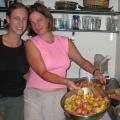![]()
|
Sandra Koelle: Community Gardener, Gleaner, Dumpster Diver |
Listen | |

|
Sandra first brought Agnès Varda's film The Gleaners and I (Les Glaneurs et la Glaneuse) to our attention and, in some important ways, inspired the Gleaning Stories project. She and Rusten had a long, wide-ranging conversation that started with Sandra's childhood growing up with a mother who was an impassioned gleaner who found gleanable food on three continents where the family lived. Her mother's story led to the story of Sandra's own commitment to gleaning, which started when she became involved with community gardens in Missoula, Montana. |
[Once the audio is playing, click and drag across the volume bars to change volume. Initial volume set to 80%.] |
| The Story of Sandra's Mother
|
I asked Sandra how she became a gleaner. She began talking about her mother, who grew up in Germany during the period of post-WWII scarcity. Sandra was born in Germany, then the family moved to Japan when she was 5, and to New York when she was 9. Her mother gleaned on all three continents, sometimes embarrassing her daughters as she inquired of neighbors and even strangers if they could glean their orchards, for example. Her mother was committed to avoiding waste and not letting opportunities to grow or collect food slip past. This first 15-minute conversation is really about Sandra's mother's odyssey from casual backyard and roadside gleaning to impassioned, almost obsessive, gleaning of commercial agricultural fields in Switzerland where she moved later in her life to take care of her own mother. |
|
| Community Gardening |
Sandra said she didn't begin gleaning herself until she became a gardener in Missoula, Montana. For her, the extensive community gardens there were her entry into real gardening. She talked about the gardens and who grew what in them ... including the Belarusians who, by the end of the growing season, were cultivating most of the abandoned plots as well as their own. |
|
| First Gleaning |
When I asked, she said her first gleaning was from the backyards of renters who, she says, are much less protective of their fruit trees than many owners. |
|
| Canning |
We got off on a tangent comparing canning methods. She's always done water-bath Mason jars, while I remembered our mother melting wax on top of the jars. |
|
| Communities of Gleaning |
Sandra says that gleaning communities exist in the context of other "local food" groups, including mushroomers, with some overlaps but often rather different interests and priorities. |
|
| Dumpster Diving |
Another strong connection, says Sandra, is between gleaning and dumpster diving. She says she's more of an "alley cruiser" than a hardcore diver, but she obviously enjoys this aspect of "urban gleaning". She started talking about a huge natural foods store in Montana that had dumpsters of out of date produce that many folks, including those who shopped regularly in the store, would browse. She shifted the conversation to Santa Cruz and Beckmann's and Kelly's bakeries, and we again got a bit sidetracked on the issue of "day old" food and changes in the ways it has been treated. |
|
| Teaching Gleaning |
A few years ago when Sandra was a teaching assistant in an undergraduate course involving issues of food and justice, she took some of her students dumpster diving. They all learned a lot about the different meanings of that activity for each of them, and about the different ways they would be "read" if they were caught. |
|
| Brussels Sprouts |
For several winters, Sandra gleaned brussels sprouts near Santa Cruz, and introduced many other folks to the practice. |
|
| Campus Food Service |
When I told Sandra that I'd assume a campus like UCSC with an agroecology program and organic farm would have some of the campus-grown food available in dining halls, for example, she reminded me of the contract structure of campus food and how Montana had to pass a law to mandate local food in schools. |
|
| A Persimmon Project in Santa Cruz? |
Sandra has long thought of organizing some kind of Persimmon Project in Santa Cruz to collect the huge number of uneaten and wasted persimmons locally and get them to folks who could eat them ... including the Vietnamese population around San Jose, for whom persimmons are a real delicacy. She talked a bit about some kindred projects in Montana and LA (Fallen Fruit). She shared some of her thoughts about projects that would combine "food in unusual places" with shared food. |
|
Podcast |
Sandra Koelle's Story of Her Mother's Gleaning |
|
Note: If you have any trouble using the audio buttons on this webpage, please let us know.
![]()

![]()

![]()

Partially Funded by the California Council for the Humanities, UC Santa Cruz, and INTA - TrainingWeal.
